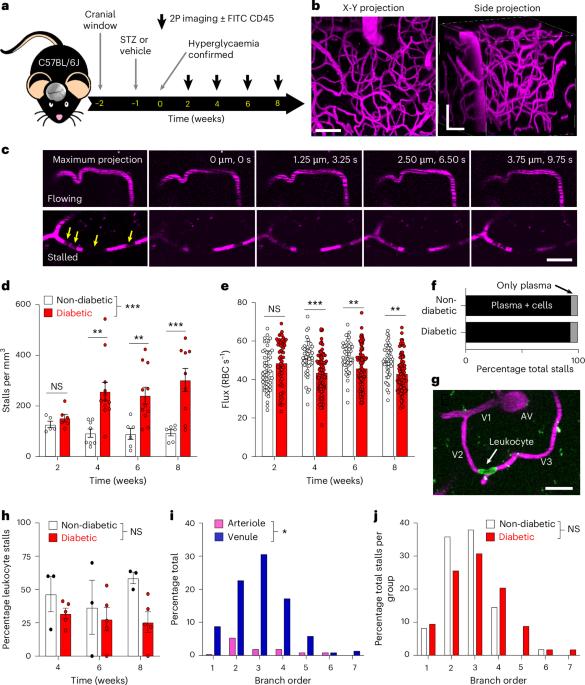A pathogenic role for IL-10 signalling in capillary stalling and cognitive impairment in type 1 diabetes
IF 18.9
1区 医学
Q1 ENDOCRINOLOGY & METABOLISM
引用次数: 0
Abstract
Vascular pathology is associated with cognitive impairment in diseases such as type 1 diabetes; however, how capillary flow is affected and the underlying mechanisms remain elusive. Here we show that capillaries in the diabetic mouse brain in both sexes are prone to stalling, with blocks consisting primarily of erythrocytes in branches off ascending venules. Screening for circulating inflammatory cytokines revealed persistently high levels of interleukin-10 (IL-10) in diabetic mice. Contrary to expectation, stimulating IL-10 signalling increased capillary obstruction, whereas inhibiting IL-10 receptors with neutralizing antibodies or endothelial specific knockdown in diabetic mice reversed these impairments. Chronic treatment of diabetic mice with IL-10 receptor neutralizing antibodies improved cerebral blood flow, increased capillary flux and diameter, downregulated haemostasis and cell adhesion-related gene expression, and reversed cognitive deficits. These data suggest that IL-10 signalling has an unexpected pathogenic role in cerebral microcirculatory defects and cognitive impairment associated with type 1 diabetes. Interleukin-10 promotes the formation of microcirculatory defects in the brain associated with cognitive impairment in a mouse model of type 1 diabetes.


IL-10 信号在 1 型糖尿病毛细血管阻滞和认知障碍中的致病作用
血管病变与 1 型糖尿病等疾病的认知功能障碍有关;然而,毛细血管流动如何受到影响及其内在机制仍然难以捉摸。在这里,我们发现糖尿病小鼠大脑中的毛细血管容易阻滞,阻滞物主要是上升静脉分支中的红细胞。对循环炎症细胞因子的筛查显示,糖尿病小鼠体内的白细胞介素-10(IL-10)水平持续偏高。与预期相反,刺激 IL-10 信号会增加毛细血管阻塞,而用中和抗体抑制 IL-10 受体或敲除糖尿病小鼠内皮特异性受体则会逆转这些损伤。用 IL-10 受体中和抗体对糖尿病小鼠进行慢性治疗可改善脑血流量,增加毛细血管通量和直径,下调止血和细胞粘附相关基因的表达,并逆转认知障碍。这些数据表明,IL-10 信号在与 1 型糖尿病相关的脑微循环缺陷和认知障碍中起着意想不到的致病作用。
本文章由计算机程序翻译,如有差异,请以英文原文为准。
求助全文
约1分钟内获得全文
求助全文
来源期刊

Nature metabolism
ENDOCRINOLOGY & METABOLISM-
CiteScore
27.50
自引率
2.40%
发文量
170
期刊介绍:
Nature Metabolism is a peer-reviewed scientific journal that covers a broad range of topics in metabolism research. It aims to advance the understanding of metabolic and homeostatic processes at a cellular and physiological level. The journal publishes research from various fields, including fundamental cell biology, basic biomedical and translational research, and integrative physiology. It focuses on how cellular metabolism affects cellular function, the physiology and homeostasis of organs and tissues, and the regulation of organismal energy homeostasis. It also investigates the molecular pathophysiology of metabolic diseases such as diabetes and obesity, as well as their treatment. Nature Metabolism follows the standards of other Nature-branded journals, with a dedicated team of professional editors, rigorous peer-review process, high standards of copy-editing and production, swift publication, and editorial independence. The journal has a high impact factor, has a certain influence in the international area, and is deeply concerned and cited by the majority of scholars.
 求助内容:
求助内容: 应助结果提醒方式:
应助结果提醒方式:


